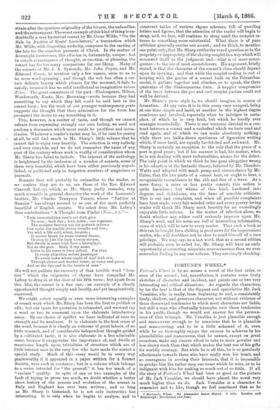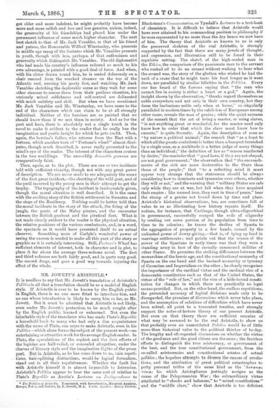FORTUNE'S WHEEL.*
Fortune's Wheel is by no means a novel of the first order, or even of the second ; but, nevertheless, it contains some lively sketches of character and incident, and paints one or two very interesting and critical situations. As regards the characters, by far the best is that of the flippant and speculative Mr. Jack Venables, who is really, from beginning to end, a consistently lively, shallow, and generous character, not without evidence of those downward tendencies to which most characters are liable, but still a man who effectually triumphs over these tendencies in his youth, though we would not answer for the perman- ence of that triumph. Mr. Venables is just plausible enough and manceuvrer enough to be conscious that he is plausible and mknecuvring, and to be a little ashamed of it, even while he so thoroughly enjoys the success he achieves by his plausibilities and manceuvres, that he cannot, except on great occasions, make any sincere effort to take to more genuine and less showy work than that which makes the best use of his gifts for worldly strategy. But while he is all this, he is so genuinely affectionate towards those who have really won his heart, and so courageous in serving their interests, that it is impossible to grudge him the rather easy sucsesses which he wins, or to be indignant with him for making so much out of so little. If all the story of Fortune's Wheel had been as good as the picture of Mr. Jack Venables, we should have placed the novel very much higher than we do. Jack Venables is a character to remember and to like, though we feel convinced that as he
• Fortune's Wheel. By Alexander Tunes Shand. 3 vols. London and Edinburgh : Blackwood and Sons.
got older and more indolent, he might probably have become more and more selfish and less and less genuine, unless, indeed, the generosity of his friendships had placed him under the permanent influence of some much higher character. The next best sketch to that of Mr. Jack Venables, is that of his friend and patron, the Honourable Wilfred Winstonley, who presents in middle age many of the features which Mr. Venables presents in youth, though with less, perhaps, of that enthusiasm and generosity which distinguish Mr. Venables. The old diplomatist who had made his country's influence redound so much to his own advantage, is painted with a good deal of force. And when, with his ulster drawn round him, he is seated dolorously on a chair rescued from the wrecked steamer on the top of the Atlantic reef, nursing his gouty foot, and watching Mr. Jack Venables sketching the deplorable scene as they wait for some other steamer to rescue them from their perilous situation, his curiously mixed selfishness and self-control are delineated with much subtlety and skill. But when we have mentioned Mr. Jack Venables and Mr. Winstanley, we have come to the end of the characters whish can claim to be at all strongly individual. Neither of the heroines are so painted that we should know them if we met them in society. And as for the poet and hero, there is absolutely not a single touch in the novel to make it evident to the reader that he really has the imagination and poetic insight for which he gets credit. Then, again, the heroine's father, who returns from the East with a fortune, which another turn of" Fortune's wheel" almost dissi- pates, though much described, is never really presented to the mind's eye of the reader. The interest of the characters centres in the two worldlings. The unworldly dramatis persono3 are comparatively faint.
Then, again, as to the plot. There are one or two incidents told with sufficient vivacity, though not with any great power of description. We are never made to see adequately the scene of the first great incident,—the shooting of the wild goat, and of the peril incurred by the young men in their attempt to get the trophy. The topography of the incident is inadequately given, though the moral situation is well described. It is the same with the exciting story of the British settlement in Sumatra and the siege of the Residency. Nothing could be better told than the moral incidents in the story of the attack, the firing of the jungle, the panic of the Malay pirates, and the encounter between the British gunboat and the piratical fleet. What is not made clearly evident to the reader is the physical situation, the relative positions of the various combatants, and, in a word, the spectacle as it would have presented itself to an actual observer. Something more of Carlyle's wonderful power of seeing the unseen is needed to make all this part of the story as graphic as it is certainly interesting. Still, Fortune's Wheel has sufficient elements of interest, both in character and in plot, to place it far above the average three-volume novel. The first and third volumes are both fairly good, and in parts very good. The second drags, and goes a good way towards injuring the effect of the whole.



































 Previous page
Previous page